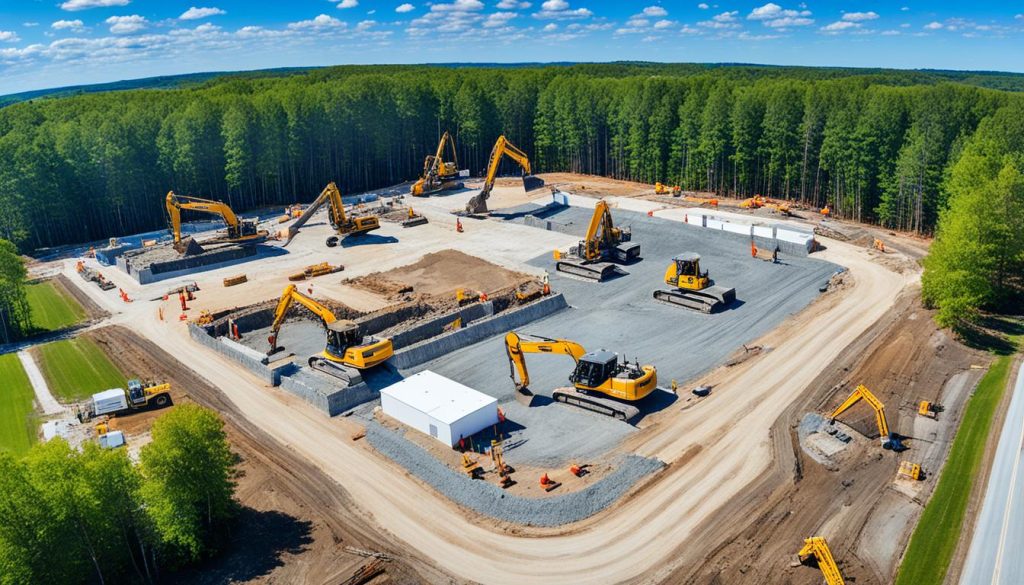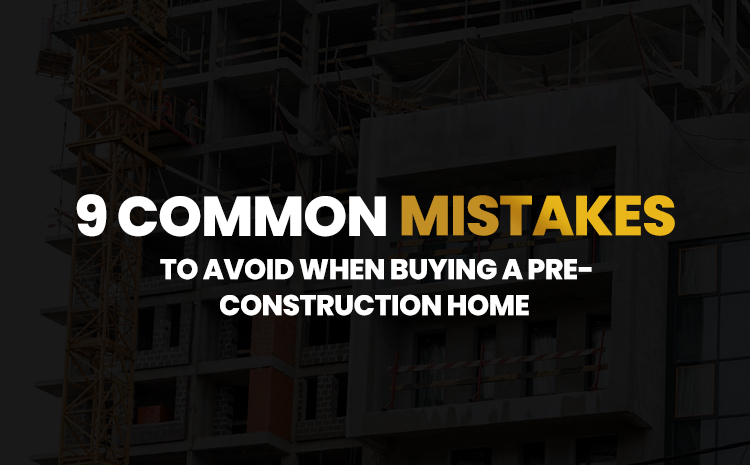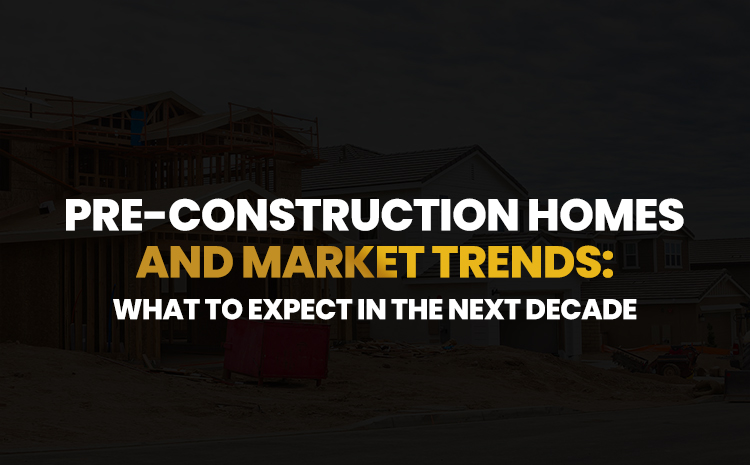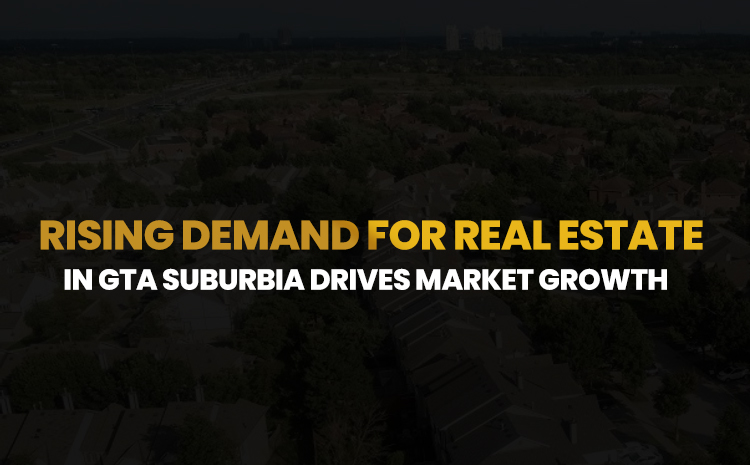(Plus A Handful of Other Less Common Mistakes to Avoid)
Before you sign that dotted line for your new pre-construction home or investment – discover these common mistakes to make sure you have made that right decision.
Buying a pre-construction home is exciting but complex.
It’s like getting a blank slate for your dream home. But, you need to be careful to avoid mistakes that could harm your investment1.
This guide will cover the top mistakes buyers make in pre-construction real estate.
We’ll talk about not knowing the buying process and missing important location details.
We aim to give you the info you need to make smart choices and get your dream home.

Related: Top 10 Benefits of Buying A Pre-Construction Home
Related: Understanding The Timeline (From Purchase to Getting Your Keys)
Mistake # 1: Failing to Understand the Pre-Construction Purchase Process
Buying a pre-construction home is different from buying a resale home.
Buyers need to know the unique steps from signing the contract to closing.
Not understanding these steps can lead to problems and delays.
The construction industry has a high failure rate compared to other sectors3.
Key Differences Between Resale and Pre-Construction Transactions
In a resale, buyers can see the property and negotiate based on what it looks like now.
But with a pre-construction buy, buyers are investing in a home that won’t be ready for a long time.
They need to understand the building process, risks, and legal “stuff”3.
Timeline of Events: From Contract Signing to Closing
The process of buying a pre-construction home takes a long time and has many steps.
Buyers need to get through contract signing, building updates, inspections, and closing3. Getting through this process right is key to avoiding problems.
- Contract signing: Buyers must review the contract well and know what they and the builder must do.
- Construction milestones: Buyers should keep up with building progress and any delays or changes.
- Inspections: Pre-closing checks are key to make sure the home is as expected.
- Closing: The last step is finishing the deal and getting the new home.
Knowing the special parts of buying a pre-construction home helps buyers go through the process better. This way, they can avoid mistakes that can happen3.
| Resale Transaction | Pre-Construction Transaction |
|---|---|
| Physical inspection of the property | Investing in a future home that may not be completed for months or years |
| Negotiation based on current condition | Deeper understanding of the construction process, potential risks, and legal implications |
| Shorter timeline | Lengthy and complex process with multiple stages |
“Payment disputes in construction arise frequently due to various reasons such as funding delays, change orders, retainage issues, lien waivers, back-charges, and disputes over work quality.”3
It’s important to know the pre-construction buying process to avoid problems and have a smooth deal.
Being aware of the timeline, differences, and challenges helps buyers make good choices. This way, they can handle the risks of pre-construction condo pitfalls, new home construction risks, off-plan property buying mistakes, and pre-build residential errors.
Mistake #2: Not Researching the Developer’s Reputation and Track Record
When you buy a pre-construction property, it’s key to check the developer’s reputation and past work. Not doing this can lead to big risks and letdowns5.
How a developer is seen can change your experience with pre-sale homes. Check their old projects, if they’re financially stable, and if they keep their promises. Make sure they finish projects on time and within budget. The developer should have the right skills, resources, and happy homeowners in the past.
Not looking into the developer’s background can cause big problems. A bad developer might not give you the home you want5. It’s important to check the developer well to dodge these issues.
- Look into the developer’s past work and what clients say
- Check if the developer is financially stable and has enough resources
- Make sure the developer is good at finishing projects on time and well
Doing your homework on the developer helps you make a smart choice and feel sure about your investment5.
“Buying a pre-construction home is a big deal, and knowing the developer’s reputation and skills is key. Not checking this can cause disappointment and financial risks.”
Misktake # 3: Overlooking the Importance of Location
Buying a pre-construction home means not ignoring the location’s importance.
Being close to shops, restaurants, and healthcare can make life better. Knowing about plans in the area helps you see how it might grow.
Proximity to Amenities and Transportation
Think about how close your home will be to shops, restaurants, and parks. Being near these things makes life easier. Also, check if it’s easy to get to public transport, highways, and airports.
Future Development Plans in the Area
It’s key to look into future plans around your home6.
New buildings, roads, or zoning changes can affect your home’s value and your life. Knowing about these can help you make a smart choice.
Ignoring the location can lead to big mistakes in buying a pre-construction home. Focus on being close to what you need and knowing what’s coming. This way, your home will meet your needs and grow in value.
Mistake # 4: Underestimating Additional Costs and Fees
Buying a pre-construction home means you’ll face extra costs and fees.
These can add up fast, making your initial price go up. Budget cuts hit healthcare hard, showing how financial issues affect services.
When buying off-plan or pre-build homes, watch out for extra charges. These include development levies, parking fees, and maintenance fees. Not planning for these costs can lead to financial trouble and might stop you from buying the home.
- Development levies: These are fees by local authorities for infrastructure and services for new developments.
- Parking fees: Some projects make you buy a parking spot, adding thousands to your costs.
- Maintenance fees: You pay monthly or yearly for upkeep of common areas and shared facilities.
To avoid guessing the total cost of your pre-construction home, do your homework. Include all possible extra expenses in your budget. This way, you’ll have a clear plan and be ready for the costs of a new home.
“Unexpected fees and hidden costs can derail even the most carefully planned pre-construction home purchase. Being diligent and proactive about understanding the full financial implications is key to a successful transaction.”
Mistake # 5: Ignoring the Fine Print in the Contract
Buying a pre-construction home means you must read the contract’s fine print carefully. This long and complex document is important. Not reading it can lead to big surprises later.
Cancellation Clauses and Penalties
Pre-construction contracts often have strict rules for cancelling and penalties. Buyers need to know these rules well. They must understand what happens if they cancel and the costs of doing so.
Builder’s Rights and Obligations
The contract also talks about the builder’s rights and duties. These can affect how the buyer feels. Things like when the house will be ready, design changes, and the builder’s right to make changes should be checked carefully.
| Potential Pre-Sale Housing Pitfalls | Preconstruction Real Estate Blunders |
|---|---|
| Overlooking cancellation clauses and penalties | Failing to understand the builder’s rights and obligations |
| Disregarding the fine print in the contract | Neglecting to thoroughly review the contract |
Reviewing the contract and understanding the fine print helps buyers avoid big mistakes. This careful reading can make buying a pre-construction home smoother and more successful.
“The contract for a pre-construction purchase is often lengthy and complex, with fine print that can have significant implications. Buyers should carefully review the contract, paying close attention to cancellation clauses, penalties, and the builder’s rights and obligations to avoid unpleasant surprises down the line.”
Mistake # 6: Failing to Inspect the Property Thoroughly Before Closing
Buying a new condo or preconstruction townhome means you must check the property before closing. Not doing this can lead to bad surprises and high costs after you buy.
Before you get your new home, make sure to look it over carefully. Check if it matches the promised quality and details. Look at everything from the ground up to spot any issues or changes from the original plan.
- Check the building’s structure, like walls, floors, and ceilings.
- Make sure the electrical, plumbing, and HVAC systems work right.
- Look at doors, windows, and cabinets for correct installation and damage.
- Check finishes like tiles, countertops, and paint for any flaws.
- Make sure all promised features and amenities are there and work well.
Doing a detailed check before closing helps you avoid bad surprises.
Sometimes you will need a third-party lienced reliable inspector to do this inspection for you.
Trust us – this minor expense will pay for your peace of mind when obvious things in the structure could have been fixed by the builder directly before possession and ownership transfer took place.
It makes sure your new condo or preconstruction townhome is what you expect.
This can save you money and trouble later.
Your new condo or preconstruction townhome is a big investment. Spending time to inspect it before closing is smart11. This way, you know your new home is just as promised.
“A detailed inspection before closing is the best way to make sure your new condo or preconstruction townhome is right and avoids high costs later.”
Mistake #7: Not Considering Resale Potential
Buying a pre-construction home means thinking about its resale value. Look at the market when it’s finished and what buyers will like.
Not thinking about this can lower your home’s value later.
Market Conditions at the Time of Completion
The real estate market changes often. The market state at your home’s finish may be very different from when you first bought. Keep up with trends, rates, and local supply and demand to keep your home competitive12.
Appealing to Future Buyers
Think about what buyers will want in the future too. Find out what people in the area like. Make sure your home has what they’re looking for, like good design, energy-saving features, and close to shops.
Thinking about resale value during the buying process helps you make smart choices. This way, your home will be more valuable and attractive to buyers later12.
Mistake #8: Sacrificing Quality for Price
Buying a pre-construction home might make you want to pick a lower price first.
But, this choice often means you’ll get less quality, leading to problems later. It’s key to find a balance between cost and quality for a good outcome and to dodge new home construction risks or off-plan property buying mistakes.
Choosing a lower price can mean getting poor materials and workmanship.
This might cause structural problems, low energy efficiency, and a shorter life for your home. Also, saving money by cutting quality can mean more repairs and costs later, eating into your savings.
- Think about the long-term value of your investment, not just the upfront cost.
- Look into the developer’s history and reputation to make sure they focus on quality.
- Check the details and materials of the pre-construction home to see if they meet your standards.
A pre-construction home is a big investment, so make choices that lead to a quality, lasting, and valuable property13. By balancing price and quality, you can skip the mistakes of choosing one over the other.
This way, you get a well-made, energy-saving home that keeps its value over time.
“The true cost of a home isn’t just the sticker price – it’s the long-term investment in its quality and durability.”
When buying a pre-construction home, always put quality first, not just the cheapest price.
This way, your investment will give you a comfy, energy-saving, and valuable home for many years, avoiding the risks of new home construction or off-plan property buying mistakes.
Mistake #9: Overlooking the Importance of Home Warranty Coverage
Buying a pre-construction home means knowing about the home warranty coverage.
It’s key to understand what’s covered and what’s not. This can help avoid many problems before they start.
Pre-construction homes come with a warranty that covers defects and construction issues. But, not checking the warranty details can lead to surprise repair costs later.
It’s vital to look over the warranty with your real estate agent or lawyer. Know what’s covered, what’s not, and how to file claims. This way, you can make a smart choice and protect your investment.
- Learn about the warranty for structural, mechanical, and electrical parts.
- Understand how long the warranty lasts and what’s not covered.
- Know how to report and fix any issues during the warranty time.
Putting the home warranty first gives you peace of mind. It helps you dodge problems with pre-build errors and sale issues. Take time to check the details and stay protected from the beginning.
Additional Less Common But Serious Mistakes to Avoid When Buying a Pre-Construction Home
Buying a pre-construction home is exciting but also risky. It’s important to know about greenfield development missteps, pre-construction condo pitfalls, and new home construction risks. This helps make sure your investment is a good one. Let’s look at two key things to think about when buying a pre-construction property.
Understanding the Risks and Potential Delays
Buying a pre-construction home comes with risks and delays. Construction timelines can change, and projects often face delays7.
Developers might also run into money problems, which can slow things down. It’s important to know about these risks and be ready for any problems.
Securing Appropriate Legal Representation
Dealing with the complex process of buying a pre-construction home needs help from legal experts. They can check the purchase contract and explain the developer’s duties.
Having the right lawyer helps protect your interests and helps you make a smart choice. It’s key to get good legal advice to avoid pre-construction condo pitfalls and new home construction risks.
Being aware of the risks and delays in pre-construction homes and getting the right legal help makes for a better decision. It’s important to plan well and do your homework before buying a pre-construction home.
Conclusion
Buying a pre-construction home in Canada needs careful thought and effort to dodge common mistakes. Knowing the buying process is key. Also, check the developer’s past work and where the home is located.
It’s important to read the contract well, paying attention to cancellation rules and what the builder must do. Also, check the property before you buy. These steps help you avoid extra costs and legal issues.
Think about how easy it will be to sell the home later. Also, make sure you have good home warranty coverage. This way, you can get the most from your pre-construction home.
Avoid mistakes like not planning for extra costs or choosing a cheaper, lower quality home. With hard work, patience, and understanding of the market, a pre-construction home can be a great investment.
FAQ
Q: What are the key differences between a resale and pre-construction transaction?
A: Buying a pre-construction home is different from buying one that’s already built. You need to know the steps from signing the contract to closing. Also, understand the main differences between the two.
Q: Why is it crucial to research the developer’s reputation and track record?
A: When you buy a pre-construction home, you’re trusting the developer. It’s key to check their reputation and past work. This ensures they can finish the project as promised.
Q: What factors should I consider when evaluating the location of a pre-construction property?
A: The location of a pre-construction home matters a lot. It affects its value and appeal. Think about how close it is to shops, transport, and future developments.
Q: What are the common risks and potential delays associated with buying a pre-construction home?
A: Buying a pre-construction home has risks like delays and changes. It’s important to know these risks. Also, having a lawyer can protect your interests.
Q: What additional costs and fees should I be aware of when purchasing a pre-construction home?
A: There are extra costs with pre-construction homes, like development fees and maintenance fees. Not planning for these can be a financial strain.
Q: What should I pay attention to when reviewing the pre-construction contract?
A: The pre-construction contract is detailed and complex. Pay attention to cancellation clauses and the builder’s rights. This helps avoid surprises later.
Q: Why is it important to conduct a thorough inspection before taking possession of a pre-construction property?
A: Inspecting the property before taking it is crucial. It checks if the home matches the promised quality. Not doing this can lead to problems and extra costs.
Q: How can the resale potential of a pre-construction home affect my investment?
A: Think about how easy the home will be to sell later. Consider market conditions and what buyers will like. This affects the home’s future value.
Q: Why is it important to strike a balance between price and quality when buying a pre-construction home?
A: Don’t just look for a low price. Choosing a cheaper home can lead to problems. Finding a good balance between price and quality is key for a good investment.
Q: What should I know about the home warranty coverage for a pre-construction property?
A: Pre-construction homes usually have a home warranty. This protects against defects and issues. But, knowing what it covers is important to avoid unexpected repair costs.







